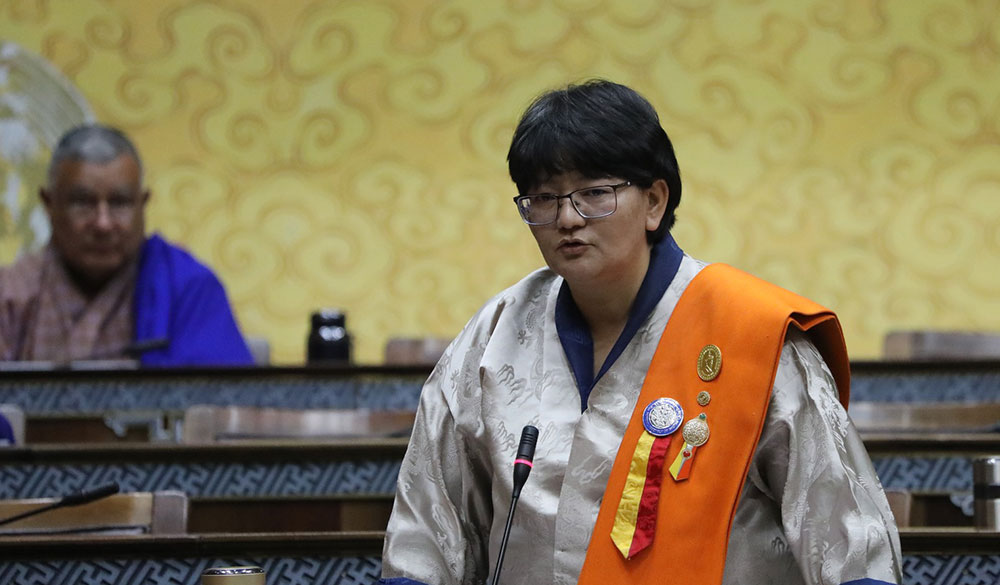YK Poudel
In what is a welcome development for people with disabilities, the National Assembly ratified the United Nations Convention on the Rights of Persons with Disabilities (CRPD) on June 14.
However, there were some reservations, particularly on four articles related to Liberty to Movement and Nationality (Article 18), Respect for home and family (Article 23), Work and Employment (Article 27), and Participation in political and public life (Article 29).
The reservations, those following the discussion on the Convention said, were a result of a lack of proper deliberation or understanding, causing confusion among implementing agencies.
On Article 23, foreign affairs and external trade minister, Dr Tandi Dorji, during the discussion on June 13, said that the possibility of PWDs with genetic disorders giving birth to disabled children is higher, which he said, was not in accordance with the health safety guidelines and policy in Bhutan. Lyonpo later clarified to Kuensel that the severity of the disorder has not been defined in the convention, which is not medically advised.
Executive Director of the Disabled People’s Association of Bhutan, Kinley Wangchuk said that the reservations are not clear. “The ratification is a supportive journey for PWDs in Bhutan. Yet, the reservations on certain sections will deprive them of basic human rights.”
The NA members also raised reservations on the right to liberty of movement and nationality.
This reservation, Kinley Wangchuk said could result in discriminatory practices where individuals with disabilities are denied or stripped of their nationality solely due to their disability. They may face barriers, he said, in accessing essential services and participating in civic activities.
Board Member of the association, Dr Sanga Dorji said that disability is a huge spectrum covering various aspects of disability. “Government, while ratifying such conventions, putting reservation way before its implementation can hinder PWDs’ ability to prove their citizenship, access public services, and ability to travel.”
On the reservation of PWDs’ right to respect for home and the family, Dr Sanga Dorji said that the government did not make a clear distinction between the way the articles were discussed and the reservations put forward.
“Although the articles show no major challenges today, in the long-run, this may hinder PWDs in availing certain services.”
“While there could be challenges like PWDs lacking financial support increasing their vulnerability to poverty, PWDs are deprived of their rights to decide freely and responsibly on the number and spacing of their children,” he said.
According to Kinley Wangchuk, without a proper family support system, PWDs may lack the necessary care, shelter, and resources to sustain themselves. “The denial of their reproductive rights and limited access to relevant information and education can exacerbate their vulnerability and contribute to their increased risk of homelessness-led issues like social isolation, diminished well-being, and reduced access to necessary services.”
The NA members, mostly cabinet ministers, also expressed reservations on PWDs’ right to work and employment.
During the discussion, Lyonchen Dr Lotay Tshering said that these reservations on labour and trade union rights were to ensure that there is no conflict with the national trade laws and policies.
Ability Bhutan Society’s programme officer, Namgay Dorji said, depriving PWDs to work and employment is one of the major pull-backs from this convention. “Although no international trade unions are present in Bhutan, when individuals and organisations wish to take part in international trade unions, the reservations will hamper them.”
He added that there is a risk of depriving PWDs from doing business at an international level. “The reservation is an exclusion of PWDs from economic decision-making processes in the country that can result in policies and laws that do not adequately address the needs and rights of persons with disabilities.”
Section A of article 29 ensures that PWDs can effectively and fully participate in political and public life on an equal basis with others. However, the reservation has deprived PWDs from participation in political and public life.
Opposition Leader, Dorji Wangdi said that over 15,000 Bhutanese are living with some form of disability. “Over 2.8 percent of Bhutanese fall under PWDs. The government in its ratification should rather approve all the articles instead of expressing reservations,” he said.
Sanga Dorji said that the election laws gave PWDs the right to vote and take part in elections with proper support and encouragement till now. “There is no need for a reservation because PWDs who cannot take part productively in elections have not been included even today.” The convention, he said, is an international convention. “Bhutan should not deprive PWDs of their fundamental right to be a part of the election system.”
Similarly, Kinley Wangchuk said that reservation about participation in political and public life impedes progress towards inclusive and responsive governance. “Voting is a fundamental right and we have witnessed senior citizens who are PWDs taking part effectively. The denial of this right undermines the principles of equality and non-discrimination.”
Health Minister, Dechen Wangmo clarified that the reservation on the Convention should not be misconstrued as not supporting the PWDs, but to provide policy space for the government in keeping with the socio-economic development situation of the country. The government, Lyonpo said, has a National Disability Policy since 2019 and will continue to look into the issues despite the reservations on four articles.
The convention is a comprehensive human rights instrument with an explicit, social development dimension.
As of date, there are 173 State Parties to the Convention.


